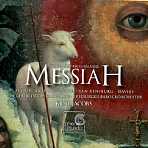Reviewing a new Messiah recording is a very serious matter. It requires more than a few hours of listening–preferably spread over a couple of days, in order to ensure a well-balanced perspective (and to give time for comparisons)–and you have to take notes. Regarding the former, on first listen the considerable impact of this decidedly, often thrillingly theatrical performance made a strong and not always agreeable impression. The dynamics, the phrasing, the expressive gestures (especially prominent in the tenor and bass solos) seemed exaggerated and somewhat distracting. But on second and third listen, these things didn’t bother me much at all (save for bass Neal Davies’ occasional manic moments); instead I noticed other mannerisms and interpretive choices that impressed (and sometimes disturbed) me more. Don’t get me wrong: this is René Jacobs’ Messiah, and his point of view, that of returning this hyper-famous work to its early dramatic and emotional roots, is successfully on display, convincingly adopted and expressed by the whole company of performers. The only question is whether or not you happen to like Jacobs’ point of view and the way his singers and orchestra realize it.
To that end, I offer a brief summary of my listening notes: “Sinfony” solid and impressive, conveying unusual presence and air of excitement and anticipation; lovely, durable “Comfort ye” and “Every valley…”; really “glorious” singing in “And the glory of the Lord”–except, what is the weird, gratuitous, Hollywood-ish sfp dynamic at the end?; bass Neal Davies is just over the top in “Thus saith the Lord of Hosts”–certainly the most violent “shaking” on disc!; clear, richly sonorous, exciting “And He shall purify”, nice tempo–but the ha-ha-ha-ha articulation is distracting and unnecessary, as proven by the lyrically-sung runs in parts of “For unto us a child is born” and “His yoke is easy”; tempo for “His yoke…” is just over the edge–too fast to properly execute melismas; “Rejoice greatly” also too fast for soprano’s comfort–why? she’s a wonderful singer, why push her?; Jacobs’ proclivity for endings with unwritten pauses and diminuendo/crescendo effects is disturbing.
“Behold the lamb of God”–Jacobs arbitrarily changes pickup 16th-notes to eighths; in “Surely He hath borne our griefs”, “surely” is correctly sung with three syllables; “All we like sheep” is ridiculously fast, but its very slow, solemn ending (also containing that strange sfp effect) nicely ties this section back to “Behold the lamb of God”; why does this very English chorus sing “that He would deleever Heem”? why does Jacobs choose to double-dot the rhythm in “Lift up your heads” and not elsewhere?; a nice crescendo effect with semi-chorus on repetitions of “Who is this King of glory?”; another odd sfp at end!; Jacobs elongates 16th-note pickup in “The Lord gave the word”; nice flowing, lilting tempo for “How beautiful are the feet”, and nice organ transition into “Their sound is gone out”; bass Davies does it again in “Why do the nations”–it’s truly “furious”, but where is the pitch?; choir actually manages to pull off the outrageously fast “Let us break their bonds asunder”; again, those weird subito dynamic shifts disrupt “Hallelujah!” chorus; Davies executes beautiful melismas in the middle section of “The trumpet shall sound”; Jacobs randomly ignores tempo markings, as in the “ma non allegro” for “The trumpet…” and the “larghetto” for “Blessing and honour, glory and power”.
So, this is a real mixed bag, unless your taste in Messiahs runs toward slightly quirky mannerisms concerning dynamics and expression, very fast tempos in some places and very slow ones in others, and toward a conductor who makes seemingly arbitrary rhythmic choices, stretching a 16th-note here and double-dotting there. Of course, every conductor makes a multitude of choices in a Messiah performance–it’s the nature of the work, what with its many versions and alterations and emendations. But when many of these have the air of affectations or even impositions, then you have to wonder what and who the performance is for, especially given the first-rate choir, orchestra, conductor, and production team. There is a lot of impressive showing off here–and a lot of really gorgeous Handel, but ultimately the overtly dramatic gestures come across as contrived and obvious rather than well-integrated and ingratiating. Jacobs’ theatrical concept certainly isn’t boring–but is it one you will want to revisit over and over? [10/24/2006]
































